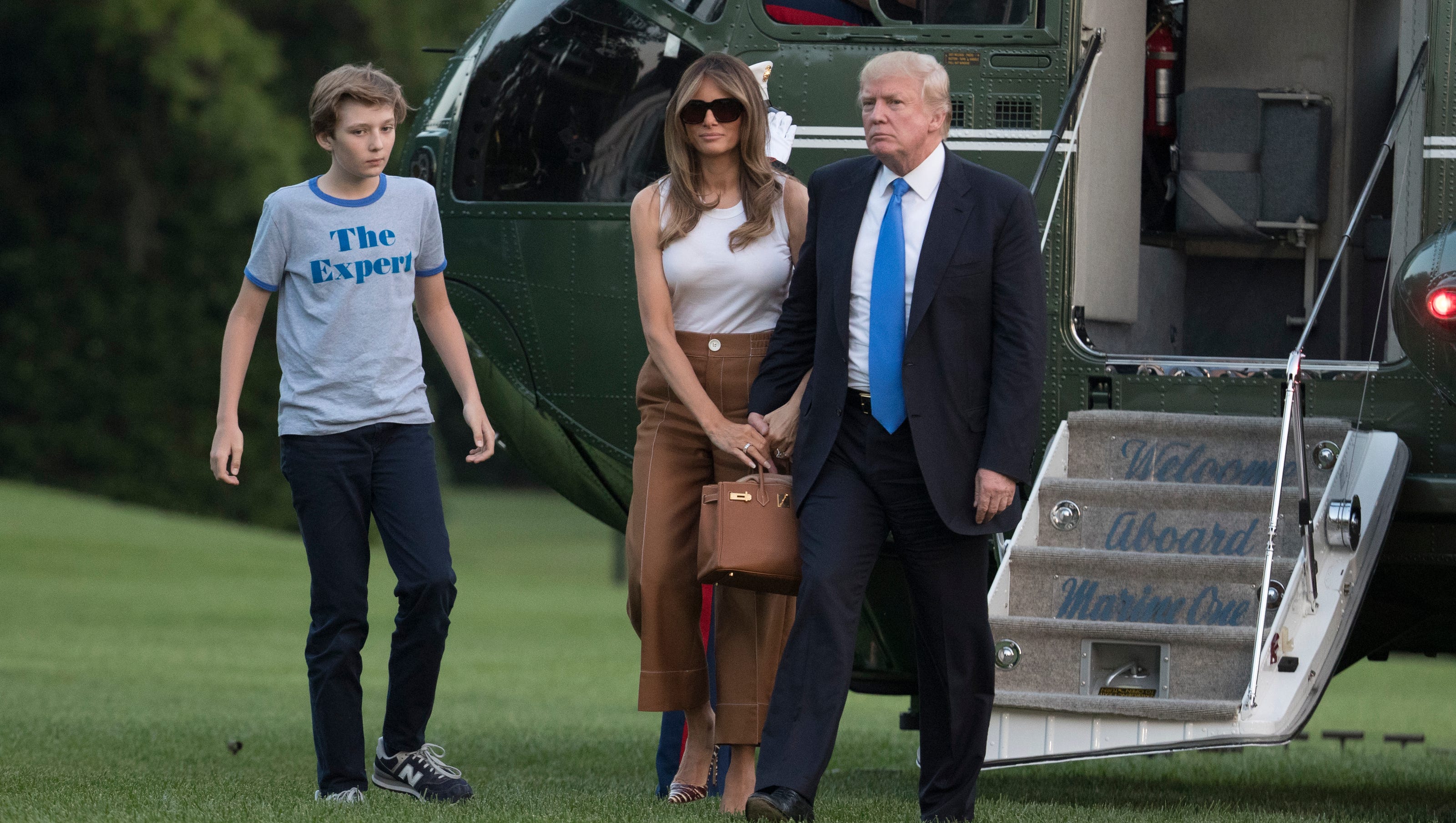In recent years, public curiosity about Barron Trump, the youngest child of former U.S. President Donald Trump and First Lady Melania Trump, has reached new heights. Amidst this attention, one recurring question has surfaced repeatedly: Is Barron Trump autistic? While this topic has sparked debates and speculation, it is crucial to approach it with sensitivity and respect for privacy. As a public figure, Barron's life has been under constant scrutiny, but it's essential to remember that he is, first and foremost, a young individual navigating his own path.
Barron Trump, born on March 20, 2006, gained prominence as the first child to reside in the White House since the Kennedy era. His presence in the public eye has led to numerous discussions about his personality, behavior, and development. However, much of what is said about him remains speculative and unverified. Rumors about Barron Trump autistic tendencies have circulated widely, but without credible evidence or confirmation from his family, these remain mere conjectures.
As we delve deeper into Barron’s life and the surrounding narratives, it’s important to balance curiosity with empathy. This article aims to provide an in-depth exploration of Barron Trump’s biography, his family dynamics, and the broader conversation about neurodiversity. By shedding light on these topics, we hope to foster a better understanding of the importance of respecting individual privacy while addressing public interest in a responsible manner.
Read also:Ronnie Howards Financial Success And Career Highlights A Closer Look
Table of Contents
- Biography of Barron Trump
- Personal Details and Bio Data
- What Are the Dynamics of Barron Trump’s Family Life?
- How Has the Public Perceived Barron Trump?
- Is Barron Trump Autistic? Exploring the Rumors
- Why Is Understanding Neurodiversity Important?
- How Can We Respect the Privacy of Public Figures?
- Frequently Asked Questions
Biography of Barron Trump
Barron Trump, the youngest child of former U.S. President Donald Trump and Melania Trump, was born on March 20, 2006, in Manhattan, New York. As the only child of his parents, Barron has often been described as a reserved and introspective individual. His life has been marked by a unique blend of privilege and public attention, given his family’s prominence in American politics and media.
From an early age, Barron was thrust into the limelight due to his father’s high-profile career. When Donald Trump announced his candidacy for the presidency in 2015, Barron became a frequent presence at campaign events, often seen standing quietly beside his parents. His reserved demeanor and limited public speaking engagements have contributed to widespread curiosity about his personality and development. Despite the speculation, Barron has maintained a low profile, attending private schools and engaging in activities typical of children his age.
During his father’s presidency, Barron became the first child to reside in the White House since the Kennedy era. This milestone brought additional attention to his life, with media outlets often speculating about his hobbies, academic performance, and social interactions. While some reports suggested he enjoyed sports and technology, others focused on his quiet nature, which fueled rumors about his potential neurodiversity. Despite the speculation, Barron’s family has consistently emphasized the importance of privacy and allowing him to grow up away from the constant glare of the media.
Personal Details and Bio Data
| Full Name | Barron William Trump |
|---|---|
| Date of Birth | March 20, 2006 |
| Place of Birth | Manhattan, New York, USA |
| Parents | Donald Trump (Father), Melania Trump (Mother) |
| Siblings | Donald Trump Jr., Ivanka Trump, Eric Trump, Tiffany Trump |
| Education | Private Schools (Details Unconfirmed) |
| Notable Events | First child to live in the White House since the Kennedy era |
What Are the Dynamics of Barron Trump’s Family Life?
Barron Trump’s family life is a blend of high-profile public figures and private moments. As the youngest child of Donald and Melania Trump, Barron has grown up in a household where media attention is a constant companion. His parents have made concerted efforts to shield him from excessive scrutiny, ensuring that his upbringing remains as normal as possible despite their extraordinary circumstances.
Donald Trump, a businessman turned politician, has often spoken fondly of Barron, referring to him as a “special boy” and expressing pride in his son’s quiet confidence. Melania Trump, on the other hand, has taken on a protective role, prioritizing Barron’s well-being and education. She has been vocal about her desire to keep him grounded and away from the pressures of public life. This dynamic has created a unique balance within the family, where Barron is both a cherished son and a symbol of the Trump legacy.
Despite their efforts to maintain privacy, Barron’s life has been subject to intense media speculation. Questions like “Is Barron Trump autistic?” have emerged, often fueled by his reserved demeanor and limited public appearances. However, his family has refrained from addressing these rumors directly, choosing instead to focus on nurturing Barron’s growth in a supportive environment. This approach highlights the importance of understanding that every family, regardless of their public status, deserves the space to raise their children without undue interference.
Read also:Jesse Spencer Chicago Fire Star Sparks Controversy
How Has the Public Perceived Barron Trump?
The public perception of Barron Trump has been shaped by a combination of curiosity, admiration, and occasional criticism. As the youngest child of a former U.S. president, Barron occupies a unique position in the public eye. His quiet and introspective nature has often been interpreted in various ways, leading to both praise and speculation about his personality and development.
Many observers have noted Barron’s calm demeanor during high-profile events, such as his father’s inauguration or state dinners at the White House. His ability to remain composed in such settings has earned him admiration from those who appreciate his maturity. However, this same reserve has also sparked rumors and questions, such as “Is Barron Trump autistic?” While these speculations lack credible evidence, they underscore the challenges faced by public figures in maintaining a private life.
In addition to admiration, Barron has also faced criticism, particularly on social media platforms. Some have scrutinized his fashion choices, academic achievements, and even his interactions with his parents. These critiques, often unwarranted, highlight the double-edged sword of fame. While Barron’s family has largely shielded him from direct media engagement, the broader public discourse continues to shape perceptions of him. It is essential to recognize that behind the headlines, Barron is a young individual navigating the complexities of adolescence, deserving of respect and understanding.
Is Barron Trump Autistic? Exploring the Rumors
One of the most persistent rumors surrounding Barron Trump is the question of whether he is autistic. This speculation has gained traction due to his reserved demeanor, limited public speaking, and occasional media portrayals that emphasize his quiet nature. However, it is important to approach this topic with caution and respect for Barron’s privacy, as no official confirmation or evidence has been provided by his family or medical professionals.
Why Do People Think Barron Trump Might Be Autistic?
The speculation about Barron Trump’s potential autism stems from a combination of factors. First, his reserved behavior in public settings has led some observers to draw comparisons with traits commonly associated with autism spectrum disorder (ASD). For instance, individuals on the spectrum often exhibit introverted tendencies, difficulty with social interactions, or a preference for routine—all of which have been attributed to Barron in media narratives. Additionally, his limited engagement with the press and preference for staying out of the spotlight have fueled further conjecture.
However, it is crucial to note that these observations are not definitive indicators of autism. Many children, especially those growing up in high-pressure environments, may display similar behaviors without being on the spectrum. Without a formal diagnosis or statement from Barron’s family, these claims remain speculative and potentially harmful. Labeling someone as autistic without evidence can perpetuate stereotypes and misunderstandings about neurodiversity.
What Are the Implications of Labeling Barron Trump Without Evidence?
Labeling Barron Trump as autistic without credible evidence carries significant implications, both for him and for broader societal perceptions of autism. First and foremost, it undermines the importance of respecting an individual’s right to privacy. Barron, like any child, deserves the opportunity to grow and develop without being subjected to baseless assumptions or public scrutiny. Assigning a label based on speculation can lead to unnecessary stress for both him and his family.
Moreover, such labeling can perpetuate harmful stereotypes about autism. Autism is a spectrum, and individuals on the spectrum exhibit a wide range of behaviors, strengths, and challenges. Reducing Barron’s personality to a single narrative based on unverified claims oversimplifies the complexity of neurodiversity. It also risks reinforcing misconceptions that equate autism with introversion or social awkwardness, which are not universal traits of the condition.
In conclusion, while curiosity about Barron Trump’s life is understandable, it is essential to approach this topic with sensitivity and respect. Instead of focusing on unfounded rumors, the conversation should shift toward fostering a greater understanding of autism and the importance of respecting individual privacy.
Why Is Understanding Neurodiversity Important?
Neurodiversity refers to the concept that neurological differences, such as autism, ADHD, and dyslexia, are natural variations in human cognition rather than disorders that need to be “fixed.” This perspective emphasizes the value of diverse ways of thinking and challenges societal norms that often marginalize individuals who think or behave differently. In the context of discussions about Barron Trump autistic rumors, understanding neurodiversity is crucial for promoting empathy, reducing stigma, and fostering inclusive communities.
How Does Neurodiversity Challenge Traditional Views?
Traditional views of neurological differences often frame them as deficits or abnormalities that need correction. For example, children with autism are sometimes subjected to interventions aimed at making them “fit in” with neurotypical standards, such as forcing eye contact or suppressing repetitive behaviors. However, the neurodiversity movement challenges these approaches by advocating for acceptance and accommodation of diverse neurological traits. It argues that society should adapt to include neurodivergent individuals rather than expecting them to conform to narrow definitions of “normal.”
This shift in perspective has profound implications for how we view individuals like Barron Trump. If the rumors about his potential autism were true, it would not diminish his worth or capabilities. Instead, it would highlight the importance of creating environments where neurodivergent individuals can thrive without fear of judgment or exclusion. By embracing neurodiversity, we can move toward a more inclusive society that values the unique contributions of all its members.
What Role Does Education Play in Promoting Neurodiversity?
Education is a powerful tool for promoting neurodiversity and dispelling myths about neurological differences. Schools, media, and community organizations play a vital role in shaping public perceptions of conditions like autism. For instance, teaching children about neurodiversity from a young age can help them develop empathy and understanding for their peers who may think or behave differently. Similarly, media portrayals that accurately represent neurodivergent individuals can challenge stereotypes and inspire positive change.
Efforts to promote neurodiversity also extend to policy and advocacy. Governments and institutions can implement measures to support neurodivergent individuals, such as providing accommodations in schools and workplaces or funding research into autism and other neurological conditions. By prioritizing education and advocacy, we can create a world where individuals like Barron Trump are celebrated for their unique qualities rather than subjected to harmful speculation.
How Can We Respect the Privacy of Public Figures?
Respecting the privacy of public figures, especially children like Barron Trump, is a responsibility that extends beyond their immediate family to include the media, the public, and society at large. While public figures often accept a certain level of scrutiny as part of their roles, children of prominent individuals deserve special consideration. Their lives are shaped not only by their family’s status but also by their own experiences, challenges, and aspirations—areas that should remain protected from undue intrusion.
Why Is Privacy Essential

